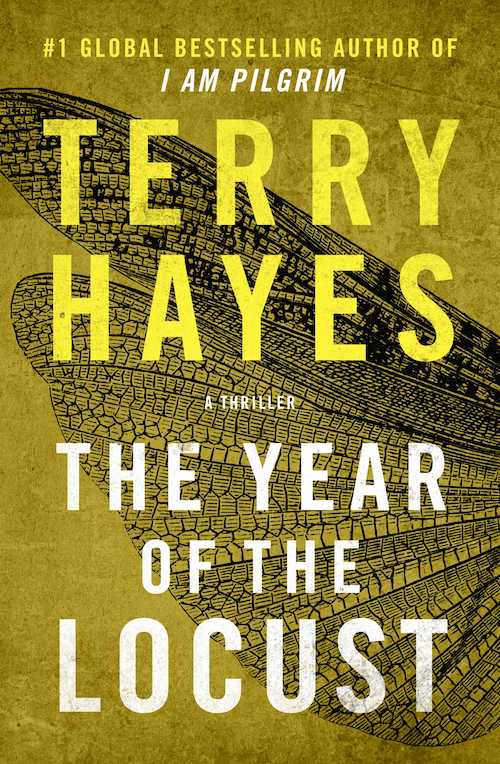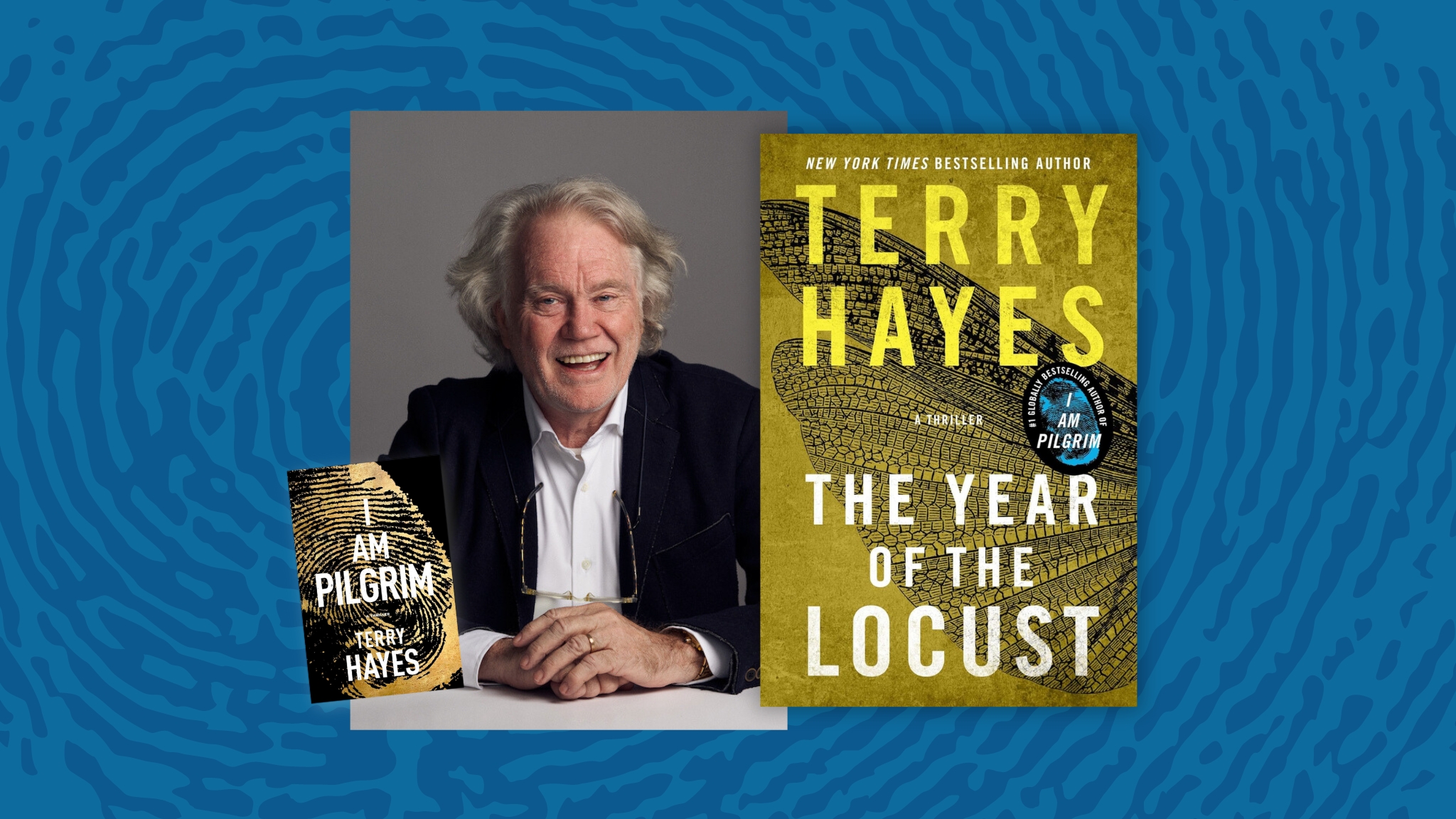The Year of the Locust by Terry Hayes
What's It About?
CIA spy Kane travels to the badlands where Pakistan, Iran and Afghanistan meet to exfiltrate a man with vital information for the safety of the West — but instead he meets an adversary who will take the world to the brink of extinction.“It’s the details that sell the story. We tell a million small truths to make them believe the one big lie.”
That is the essence of the spy game. Those details, and the style and manner in which they are conveyed, are what made I Am Pilgrim by Terry Hayes one of the iconic spy novels of our time.
I Am Pilgrim was written in 2014. Who knew that Hayes, a movie producer, had such a flair for prose, a thriller to top all thrillers, deft character development and the art of the perfect cliffhanger to end every chapter.
I learned of this book from, of all people, the 95-year-old mother of a friend. Bailey gave me her copy (but it was large type so I had to replace it). Trying to imagine this dear woman caught up in international terrorism, the clandestine world of the CIA, graphic atrocities like public beheadings, cringeworthy horror— somehow, incredulously, our reading tastes were on the same page.
I Am Pilgrim became my standard-bearer. When people asked me for book recommendations, I Am Pilgrim always topped the list.
But with that kind of praise, from me as well as numerous highly decorated critics, what do you do for an encore?
Well, nothing – at least for the next 10 years. The Year of the Locust has been highly anticipated. Readers visiting any book site would have seen its release date bounce about for a decade. But when the publisher, Atria/Emily Bestler Books, declared that the wait was over with a scheduled release in early February, finally Pilgrim faithfuls could scrap medications and abandon their support groups – they were about to be rehabilitated.
Or were they? They had to wonder: Was it worth the wait?
Hayes’ narrator, a so-called Denied Access-Area CIA spy who goes by the name of Kane, sucks you right back in on the opening page and the opening line, “I once went to kill a man.”
It was an assignment characteristic of the spy modus operandi: “I was being asked to find a white male of indeterminate height and nationality, with a name we didn’t know, in a place we couldn’t identify, wearing a face we had never seen, and leaving fingerprints that weren’t his own.”
A bit trickier than solving Wordle.
Kane keeps the task in perspective, free of emotion, even though his target is a traitor responsible for the gruesome executions of 10 CIA operatives.
Yes, keep your head in an emotion-free zone. “If it’s revenge you’re after,” he’s been taught, “dig two graves.”
Kane describes the scene, having eventually tracked down the traitor merrily cooking dinner in his kitchen on the other side of the world. Just when you’d expect our hero to pounce, the traitor pulls a spectacular move and flees from Kane’s grasp.
Yet does Kane despair? He marvels at Magus’ maneuver and notes, “He taught me a brilliant trick, a remarkable piece of tradecraft, that ended up saving my life.”
It is this early piece of writing in Locust that quickly reminded me why I loved Pilgrim. Another 800 pages of this? No sweat.
Check out BookTrib’s Interview with Terry Hayes
In Locust, Kane travels to the badlands where the borders of Pakistan, Iran and Afghanistan meet to find another man with vital information for the safety of the West. But instead, he faces an adversary, a smart, religious, strong and vicious terrorist with plans to take the world to the brink of extinction.
The book has all of Hayes’ signature trappings: clever, precise and intelligent writing; believable characters even if their missions are hard to believe; an intricate plot; lessons in history, geography, cultures and politics; and a penetrating look, professionally and personally, into the mind of a spy.
Kane’s comment that details sell the story could not be more appropriate. Every detail, every maneuver, every jaunt into enemy territory is strategized with the most intricate precision, and Hayes lets hungry readers into the process. It’s the only way spies can survive. Looks, language, background. At one point, Kane takes self-inflicted bodily harm, forcing him to use crutches, if it will sell his cover.
Even Hayes’ explanation about the development of spores, tiny one-cell particles that fall from the skies like snowflakes and kill all those in their paths, takes pages and pages of complicated scientific detail, making readers paralyzed, intrigued and amazed. Really? Is this believable? Or is it just pie in the, ahem, spy?
The same for Hayes’ introduction of an unusual time travel sequence, with a nod to A Christmas Carol for its glimpse into a bleak future forcing Kane to return to the present to try to correct.
And what’s to say about coincidence, that bane of literary license? In Locust, things happen to help bring plot elements together. It’s one thing to buy into the great research and detail behind creating a spy’s so-called “legend,” his claimed background supported by documents and memorized details. It’s another to stumble upon people in the most unlikely places as a convenient way to tie up loose ends.
In thinking about I Am Pilgrim and The Year of the Locust, for some reason I’m reminded of the expression that you never forget your first kiss.
I Am Pilgrim was a special book in my life as a reader. I loved it and couldn’t wait for Hayes’ next one.
You never forget your first kiss. But who remembers their second?
Perhaps it’s unfair to expect another passionate love affair with the second book, especially having set the bar of lofty expectations at such an unattainable height.
Yet even with all those dynamics working against it, The Year of the Locust is a treat in its own right, with much of the magnificence and splendor of its predecessor in terms of writing, detail, story and characterization. All I ask, Mr. Hayes, is that if you have another book in you, please don’t make us wait another decade for its arrival. I want to ensure I’m around to savor it.
About Terry Hayes:
Terry Hayes is the New York Times bestselling author of I Am Pilgrim and The Year of the Locust and is the award-winning writer and producer of numerous movies. His credits include Payback, Road Warrior, and Dead Calm (featuring Nicole Kidman). He lives in Switzerland with his wife, Kristen, and their four children.





